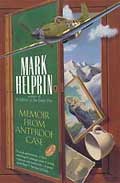 This book review was originally published on Critics’ Choice on May 24, 1995.
This book review was originally published on Critics’ Choice on May 24, 1995.
The protagonist of Mark Helprin’s fourth novel has been the friend and confidante of popes, presidents, investment bankers, veterans of both World Wars, thieves, and murderers. He’s travelled around the world, flown fighter planes against the Nazis, and stolen millions of dollars of gold bullion.
Yet now he spends his last days as an anonymous old English teacher in Brazil, writing down his memoirs for his young son and waiting for the inevitable time when his past will catch up with him. So he resorts to the best security measures he can dig up in the forgotten villa he’s settled down in: a Walther P-88 for the potential assassin and an antproof case for his manuscript in progress.
Memoir from Antproof Case aspires to be something we don’t see much of anymore: a comprehensive satire and send-up of the American century. The nameless narrator embodies all the bravado and fondness for hyperbole that characterizes this country’s recent history, but unfortunately Helprin’s not up to the task. After 514 pages of non-chronological tall tales, you’re left with one of the more unsettling questions a reader can have about a book — what was that all about?
If you take Helprin’s narrator at face value, Antproof Case is really about the ceaseless struggle against the unmitigated evils of coffee. Our hero spends much of his near-century expounding on the maliciousness of the caffeinated bean, intimidating those who offer it to him and lecturing those several hundred million of us who have fallen prey to its druggish yoke. Reading between the lines, it’s not too difficult to see the connections between coffee and the traumatic episodes of the narrator’s childhood.
But in a way, the book really is about coffee. Memoir from Antproof Case is about bringing the poisons and obsessions of a selfish and greed-obsessed culture back into the jungle where they belong, and reverting to the simpler things of the narrator’s Brazil — dancing on the beach, for instance, and making love with youthful abandon. The fact that our protagonist chooses to make a mild drug like coffee the target of his ire only shows the naivete and impossibility of such a desire.
Helprin would like you to see this ambition as charming, and some readers may see it in such a light. But for the rest of us, the payoff at novel’s end isn’t worth trudging through hundreds of pages of the narrator’s improbable adventures.
I guess I’m one of those readers who can see the book as charming, and more. I absolutely love Helprin’s prose and find that the scenes and the detail are satisfying on a grand scale. He doesn’t need big climaxes, the story and story telling are worth the read for their own sake. 🙂